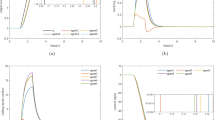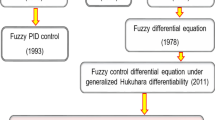Abstract
By introducing some slack matrices, this paper proposes less conservative robust stabilization conditions for the polynomial fuzzy system with parametric uncertainties. In the proposed methods, no inverse polynomial matrices are chosen as the decision variables so that each element of the gain and the Lyapunov matrices can be guaranteed to strictly be a polynomial function. Therefore, the hardware implementation cost of operating the proposed controller is reduced because no rational functions need to be computed. Moreover, the fuzzy controllers are designed under perfect and imperfect premise matching conditions to enhance the design flexibility. Finally, some numerical examples are given to demonstrate the effectiveness of the proposed methods.
Similar content being viewed by others
References
T. Takagi and M. Sugeno, “Fuzzy identification of systems and its applications to modeling and control,” IEEE Trans. on Syst., Man, Cybern., vol.SMC-15, no. 1, pp. 116–132, 1985.
K. Tanaka, T. Ikeda, and H. O. Wang, “Fuzzy regulators and fuzzy observers: relaxed stability conditions and LMI-based designs,” IEEE Trans. Fuzzy Syst., vol. 6, no. 2, pp. 250–265, 1998.
G. B. Koo, J. B. Park, and Y. H. Joo, “Intelligent digital redesign for nonlinear systems using a guaranteed cost control method,” Int. J. Cont., Autom., Syst., vol. 11, no. 6, pp. 1075–1083, 2013. [click]
H. J. Lee, H. Kim, Y. H. Joo, W. Chang, and J. B. Park, “A new intelligent digital redesign for TS fuzzy systems: global approach,” IEEE Trans. Fuzzy Syst., vol. 12, no. 2, pp. 274–284, 2004.
D. H. Lee, Y. H. Joo, and M. H. Tak, “LMI conditions for local stability and stabilization of continuous-time T–S fuzzy systems,” Int. J. Cont., Autom., Syst., vol. 13, no. 4, pp. 986–994, 2015. [click]
D. H. Lee, J. B. Park, Y. H. Joo, and S. K. Kim, “Local H ∞ controller design for continuous-time T–S fuzzy systems,” Int. J. Cont., Autom., Syst., vol. 13, no. 6, pp. 1499–1507, 2015. [click]
H. D. Tuan, P. Apkarian, T. Narikiyo, and Y. Yamamoto, “Parameterized linear matrix inequality techniques in fuzzy control system design,” IEEE Trans. Fuzzy Syst., vol. 9, no. 2, pp. 423–432, 2001.
K. Tanaka and H. O. Wang, Fuzzy Control Systems Design and Analysis: A Linear Matrix Inequality Approach, Wiley, 2001.
H. O. Wang, K. Tanaka, and M. F. Griffin, “An approach to fuzzy control of nonlinear systems: stability and design issues,” IEEE Trans. Fuzzy Syst., vol. 4, no. 1, pp. 14–23, 1996.
K. Tanaka, H. Yoshida, H. Ohtake, and H. O. Wang, “A sum-of-squares approach to modeling and control of nonlinear dynamical systems with polynomial fuzzy systems,” IEEE Trans. Fuzzy Syst., vol. 17, no. 4, pp. 911–922, 2009.
H. K. Lam, M. Narimani, H. Li, and H. Liu, “Stability analysis of polynomial-fuzzy-model-based control systems using switching polynomial Lyapunov function,” IEEE Trans. Fuzzy Syst., vol. 21, no. 5, pp. 800–813, 2013.
H. S. Kim, J. B. Park, and Y. H. Joo, “Stabilization of polynomial fuzzy large-scale system: sum-of-square approach,” ICCAS 2011, pp. 1462–1466, 2011.
H. S. Kim, J. B. Park, and Y. H. Joo, “Further relaxed stability conditions for continuous-time polynomial fuzzy system based on polynomial fuzzy Lyapunov function,” FUZZ-IEEE, pp. 1–5, 2012.
H. S. Kim, J. B. Park, and Y. H. Joo, “Relaxed stability condition for polynomial fuzzy system: Non-quadratic Lyapunov function approach,” ICCAS 2013, pp. 673–676, 2013.
H. K. Lam and L. D. Seneviratne, “Stability analysis of polynomial fuzzy-model-based control systems under perfect/ imperfect premise matching,” IET Cont. Theory Appl., vol. 5, no. 15, pp. 1689–1697, 2011.
H. K. Lam and F. H. F. Leung, “LMI-based stability and performance design of fuzzy control systems: fuzzy models and controllers with different premise,” FUZZ-IEEE 2006, pp. 9499–9506, 2006.
H. K. Lam and M. Narimani, “Stability analysis and performance design for fuzzy-model-based control system under imperfect premise matching,” IEEE Trans. Fuzzy Syst., vol. 17, no. 4, pp. 949–961, 2009.
H. J. Kim, G. B. Park, J. B. Park, and Y. H. Joo, “Decentralized sampled-data H ∞ fuzzy filter for nonlinear largescale systems,” Fuzzy Sets Syst., vol. 273, pp. 68–86, 2015. [click]
S. Prajna, A. Papachristodoulou, and W. Fen, “Nonlinear control synthesis by sum of squares optimization: a Lyapunov-based approach,” Proc. of 5th Asian Control Conference 2004, pp. 157–165, 2004.
A. Papachristodoulou and S. Prajna, “A tutorial on sum of squares techniques for systems analysis,” Proc. of American Control Conference, pp. 2686–2700, 2005.
H. J. Lee, J. B. Park, and Y. H. Joo, “Robust fuzzy control of nonlinear systems with parametric uncertainties,” IEEE Trans. Fuzzy Systems, vol. 9, no. 2, pp. 369–379, 2001.
D. H. Lee, J. B. Park, Y. H. Joo, K. C. Lin, and C. H. Han, “Robust H ∞ control for uncertain nonlinear active magnetic bearing systems via Takagi-Sugeno fuzzy models,” Int. J. Cont., Autom., Syst., vol. 8, no. 3, pp. 636–646, 2010.
H. C. Sung, J. B. Park, and Y. H. Joo, “Robust digital control of fuzzy systems with parametric uncertainties: LMIbased digital redesign approach,” Fuzzy Sets Syst., vol. 161, no. 6, pp. 919–933, 2010. [click]
H. S. Kim, J. B. Park, and Y. H. Joo, “Robust stabilization condition for a polynomial fuzzy system with parametric uncertainties,” ICCAS 2012, pp. 107–111, 2012.
S. Prajna, A. Papachristodoulou, P. Seiler, and P. A. Parrilo, “SOSTOOLS: sum of squares optimization toolbox for MATLAB, version 2.00,” California Inst. Technol., Pasadena, 2004.
L. Xie, “Output feedback H ∞ control of systems with parameter uncertainties,” Int. J. Cont., vol. 63, no. 4, pp. 741–750, 1996. [click]
E. Kim and H. Lee, “New approaches to realxed quadratic stability condition of fuzzy control systems,” IEEE Trans. Fuzzy Syst., vol. 8, no. 5, pp. 523–534, 2000.
D. H. Lee and Y. H. Joo, “LMI-based robust sampled-data stabilization of polytopic LTI systems: A truncated power series expansion approach,” Int. J. Cont., Autom., Syst., vol. 13, no. 2. pp. 284–291, 2015. [click]
D. H. Lee, Y. H. Joo, and S. K. Kim, “H ∞ digital redesign for LTI systems,” Int. J. Cont., Autom., Syst., vol. 13, no. 3. pp. 603–610, 2015. [click]
Author information
Authors and Affiliations
Corresponding author
Additional information
Recommended by Associate Editor Do Wan Kim under the direction of Editor Euntai Kim. This work was supported in part by a National Research Foundation of Korea grant funded by the Korea government (MEST) (NRF-2015R1A2A2A05001610).
Han Sol Kim received his B.S. degree in Electronic and Computer Engineering from Hanyang University, Korea, in 2011 and his M.S. degree in Electrical and Electronic Engineering, Yonsei University, Korea, in 2012. From 2012, he is working toward a Ph.D. degree in Electrical and Electronic Engineering, Yonsei University, Korea. His current research interests include stability analysis in fuzzy systems, fuzzy-model-based control, and polynomial fuzzy systems.
Jin Bae Park received his B.S. degree in Electrical Engineering from Yonsei University, Seoul, Korea, and his M.S. and Ph.D. degrees in Electrical Engineering from Kansas State University, Manhattan, KS, USA, in 1977, 1985, and 1990, respectively. Since 1992, he has been with the Department of Electrical and Electronic Engineering, Yonsei University, where he is currently a Professor. His major research interests include robust control and filtering, nonlinear control, intelligent mobile robot, fuzzy logic control, neural networks, chaos theory, and genetic algorithms. He served as the Editor-in-Chief for the International Journal of Control, Automation, and Systems (IJCAS) (2005-2010) and the President for Institute of Control, Robotics, and Systems (ICROS) (2013), and the Vice-President for Yonsei University (2014-2015).
Young Hoon Joo received his B.S., M.S., and Ph.D. degrees in Electrical Engineering from Yonsei University, Seoul, Korea, in 1982, 1984, and 1995, respectively. He worked with Samsung Electronics Company, Seoul, Korea, from 1986 to 1995, as a project manager. He was with the University of Houston, Houston, TX, from 1998 to 1999, as a visiting professor in the Department of Electrical and Computer Engineering. He is currently a professor in the Department of Control and Robotics Engineering, Kunsan National University, Korea. His major interest is mainly in the field of intelligent robot, intelligent control, robot vision, human-robot interaction, wind farm control, and intelligent surveillance systems. He severed as President for Korea Institute of Intelligent Systems (KIIS) (2008-2009) and is serving as the Vice-President for the Korean Institute of Electrical Engineers (KIEE) (2016-present) and as the Vice-President for Institute of Control, Robotics, and Systems (ICROS) (2016-present), and as the Editor-in-Chief for the International Journal of Control, Automation, and Systems (IJCAS) (2014-present).
Rights and permissions
About this article
Cite this article
Kim, H.S., Park, J.B. & Joo, Y.H. Less conservative robust stabilization conditions for the uncertain polynomial fuzzy system under perfect and imperfect premise matching. Int. J. Control Autom. Syst. 14, 1588–1598 (2016). https://doi.org/10.1007/s12555-015-0380-9
Received:
Revised:
Accepted:
Published:
Issue Date:
DOI: https://doi.org/10.1007/s12555-015-0380-9




